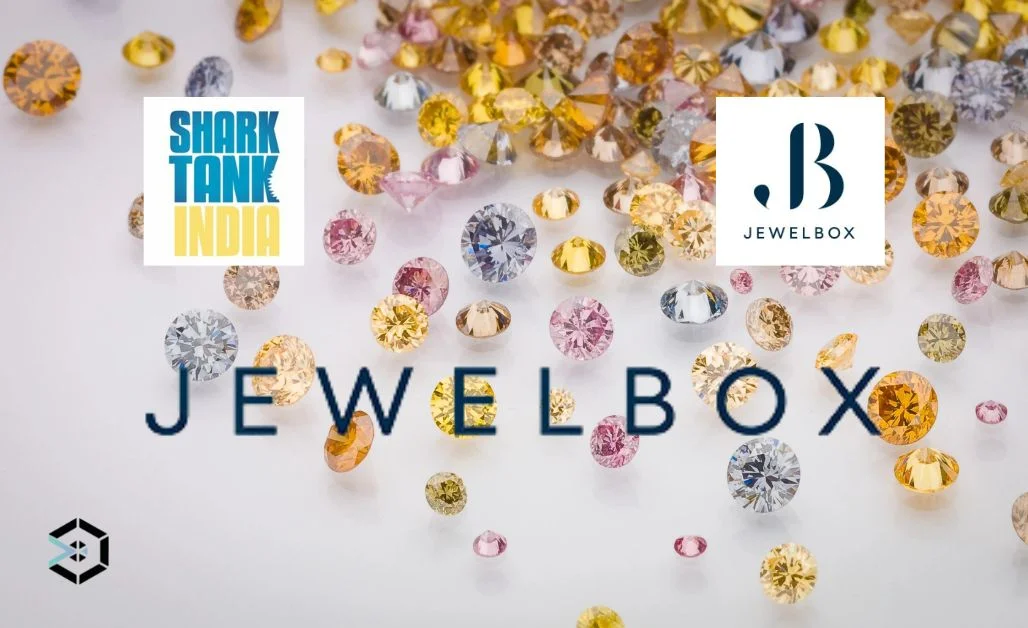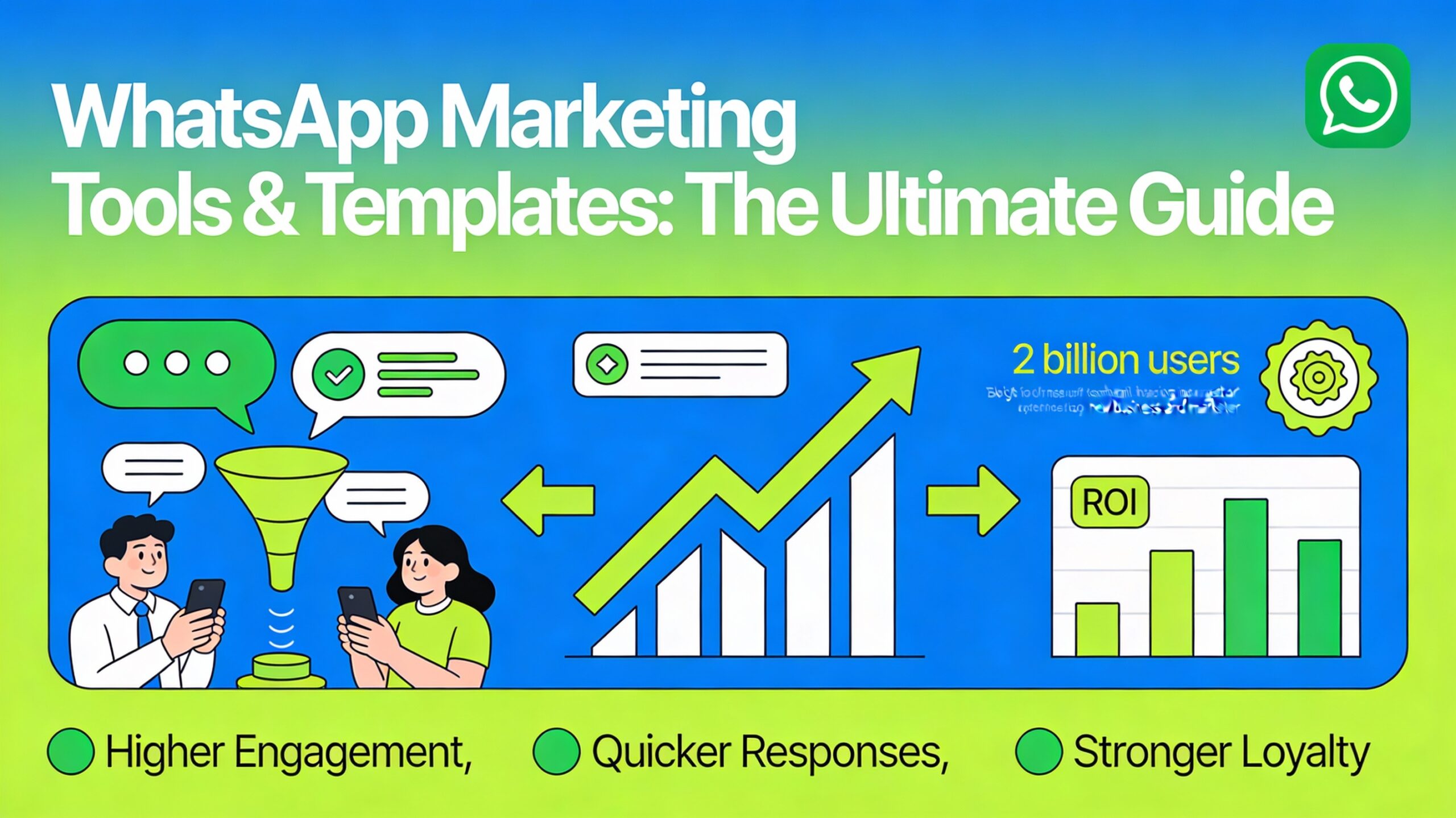Jewel Box is a conscious luxury brand that makes fine jewellery for every day and occasion wear using lab-grown diamonds (LGD). It is an honest and transparent brand where every jewellery is hallmarked and certified.
Jewel Box, featured on Shark Tank India Season 3, sought to raise Rs 1 crore for 2% equity with a valuation of Rs 50 crore.
Here is the Jewel Box Product Review and complete market analysis of Jewel Box as Business Model of lab-grown diamonds, financial performance, investment specifications, and plans.
Before we dive into the company analysis, let us first understand what are Lab-Grown Diamonds and how are they different from Natural Diamonds.
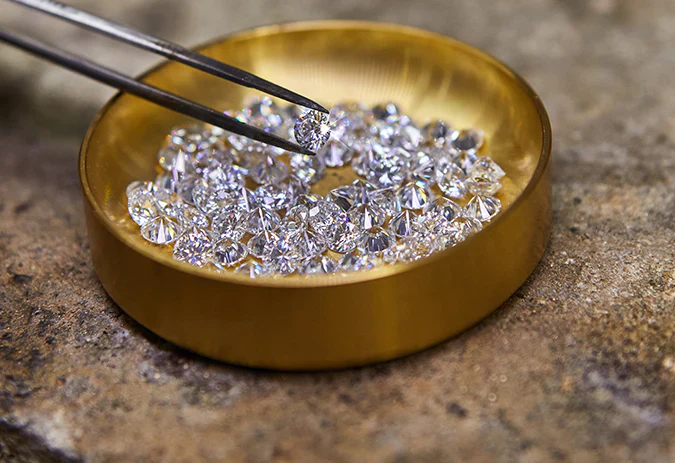
Lab Grown Diamonds (LGDs), also referred to as man-made diamonds or lab diamonds, are real diamonds that are made or manufactured in a lab using advanced reactors that mimic the conditions under which natural diamonds develop under earth.
Instead of being mined from the Earth, lab grown diamonds are manufactured in a lab and hence do not harm the planet and are more ethical and environment friendly.
They are chemically, physically and optically the same as natural diamonds, with the main difference being in the origin of the diamond. LGDs are environment friendly, more ethical and cheaper than natural diamonds.
Moreover, lab grown diamonds are graded in the same way as natural diamonds through 4 C’s: cut, colour, clarity and carat.
Natural Diamonds vs Lab Grown Diamonds
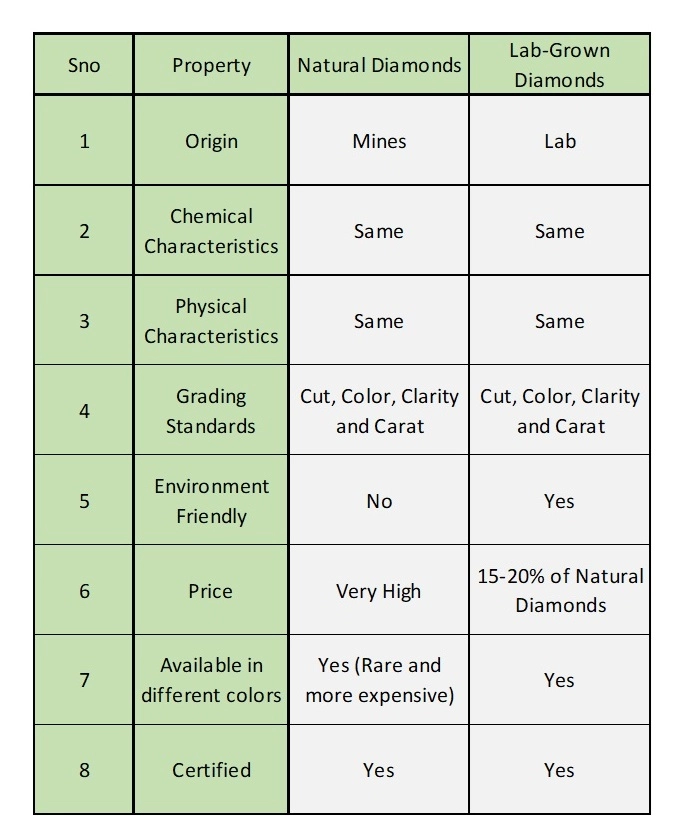
It is clear from the above table and from several experts that practically lab grown and natural diamonds are essentially the same thing, the only difference being the origin.
The difference between a natural diamond and a lab-grown diamond can only be spotted with specialized tests using high-tech equipments and cannot be differentiated with naked eye (Source: www.hiholden.com).
How Lab Grown Diamonds are made?
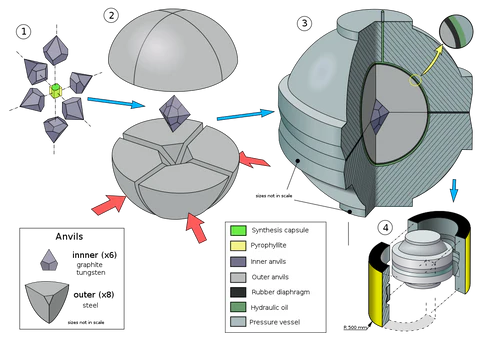
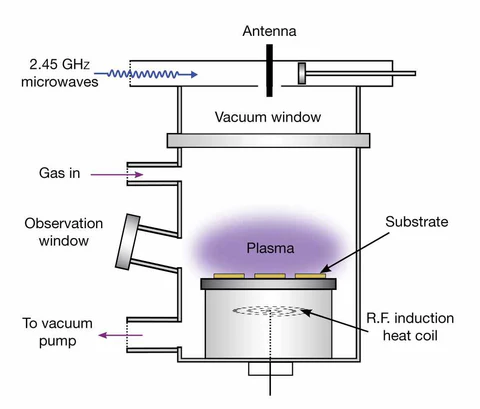
Lab diamonds can be grown in one of two ways:
- High Pressure High Temperature (HPHT)
In the HPHT method, intense heat and pressure are applied to pure carbon within a metal chamber using electrical pulses. This extreme environment forces the carbon atoms to rearrange themselves into a diamond crystal structure. Any metallic impurities that remain trapped inside an HPHT created diamond are typically very small and invisible to the human eye. - Chemical Vapour Deposition (CVD)
In the Chemical Vapour Deposition (CVD) process, a tiny diamond seed is placed inside a chamber filled with a hydrocarbon gas. The chamber is then heated to very high temperatures. This intense heat breaks down the gas molecules, releasing carbon atoms. These carbon atoms are attracted to the seed and bond to its surface, gradually enlarging it layer by layer. Over a relatively short period of weeks, this process transforms the seed into a complete diamond.
According to diamond experts, lab diamonds created using HPHT are of better quality than created using CVD process, as CVD diamonds usually have a brownish undertone and need to undergo post-growth treatment to enhance their beauty.
Now that we know the difference between LGDs and natural diamonds, let’s dive into the pitch analysis of Jewel Box at Shark India Season 3.
Jewel Box Company’s Overview
Jewel Box is a Kolkata-based start-up founded in 2022. It is a conscious luxury brand specializing in lab-grown diamonds. The company is uniquely placed in the luxury jewellery market, strongly emphasizing design, craftsmanship, and transparency.
In Shark Tank India Season 3, they highlighted their innovative approach to fine jewellery. The company offers sustainable and affordable Lab Grown Diamonds for everyday use and special occasions. The cost of Jewel box Diamonds is 80 to 85% less than that of natural diamonds.
About The Founders
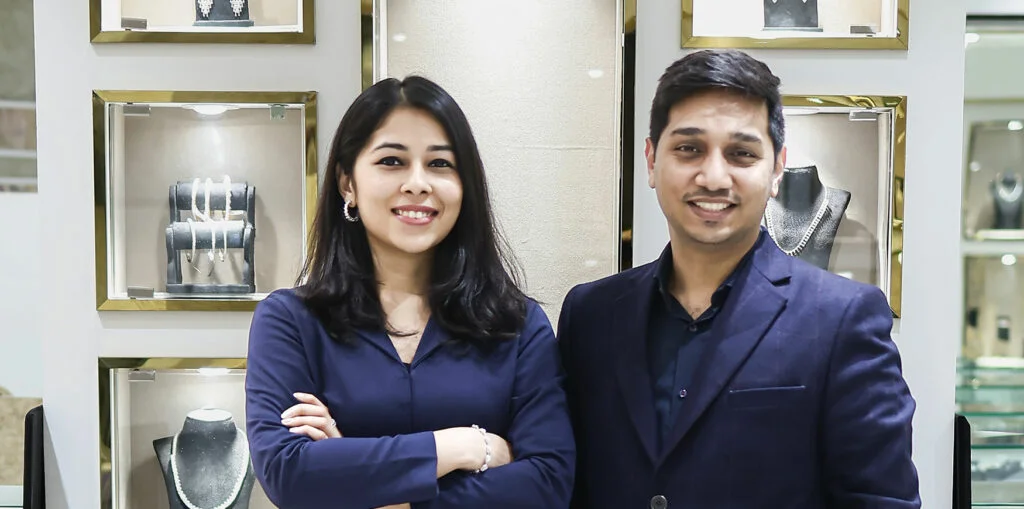
- Nipun Kochar: The Chief Executive Officer (CEO) oversees finance, operations, and strategic procurement.
- Vidita Kochar: The Chief Marketing Officer (CMO), who has an MBA background, manages design, marketing, digital business, and procurement.
The founders claimed in the show, their lab-grown diamonds are certified by top institutes like the International Gemological Institute and the Gemological Institute of America.
Each piece of jewellery is hallmarked and certified, offering customers 80% buyback and 100% exchange benefits, which builds trust and satisfaction.
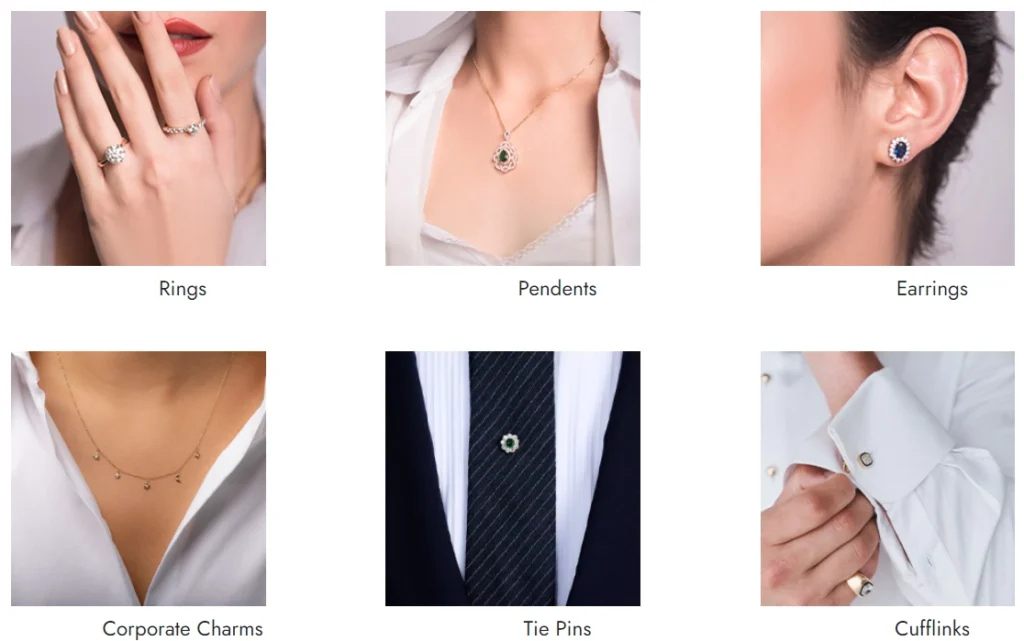
Jewel Box specializes in fine jewellery made from lab-grown diamonds (LGDs), which are physically, chemically, and optically identical to natural diamonds but cost 80%-85% less.
Lab diamonds are created by replicating the natural diamond formation process in a lab under controlled conditions:
- Starting with a thin seed of a natural diamond placed in a reactor at, 2300°F.
- Using a combination of carbon and methane gases.
- The process takes around 21–24 days to form a 1-carat stone.
Their LGD jewellery is sustainable, accessible, and indistinguishable from natural diamond jewellery. Each piece of jewellery from Jewel Box is certified and hallmarked.
In their research, Nipun and Vidita, found out that 90% of Indians do not own a diamond and that natural diamonds are expensive and not practical, especially for the new generation as they seek more value in things.
Moreover, lab grown diamonds are creatng a wave in the US with its acceptability going up significantly in the last few years. They saw a gap and opportunity in the market and this led to their entrepreneurial journey with Jewel Box.
Jewel Box jewellery can be bought from an offline retail outlet in Kolkata, across experiential stores and from their website, www.jewelbox.co.in. To maintain trust, they have a standard buyback or exchange policy, as offered by most diamond jewellery brands. They offer customers an 80% buyback and 100% exchange benefits.
You can refer to their
They promote their lab-grown diamonds as an eco-friendly and affordable alternative to natural diamonds. Jewel Box also ensures transparency and quality in their products, making them a trustworthy choice for consumers looking for luxury jewellery at an affordable price.
They have an in-house design and quality check team to ensure that only the best products are provided to their customers.
Jewel Box Product Review in 2024:
Most of the customers have liked Jewel Box products and have shared tons of reviews on different platform like Google and Amazon. Here are some reviews shared by the customers on Google about their products:
Jewel Box Market Analysis
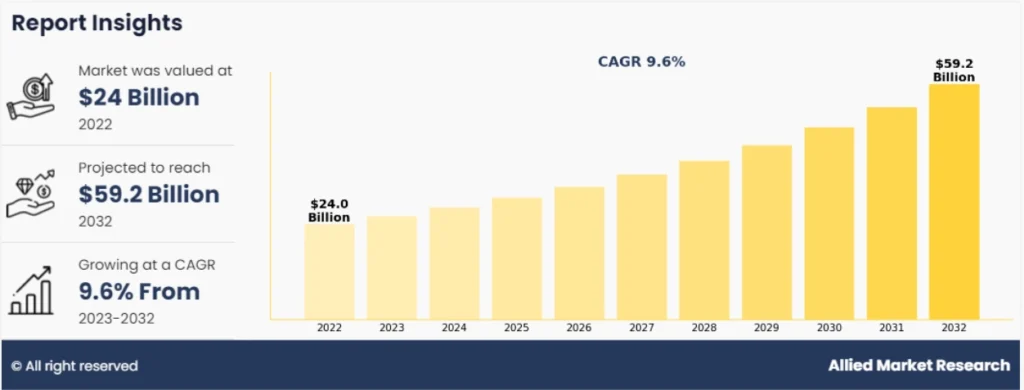
The global market for lab-grown diamonds was worth $24 billion in 2022. It is expected to grow to $59.2 billion by 2032, increasing at an average rate of 9.6% annually from 2023 to 2032.
With the lab grown diamonds, one of the biggest concern is consumer mindset, that they don’t feel they are buying an actual diamond and that it is better to buy a real diamond instead of a lab diamond.
The founders in their research found out that only 1% percentage of engagement rings were made of lab diamonds in 2017. But in 2021, when they were doing their research, it went upto 23% and in 2023, when the episode was shot, it was approximately 36%.
A study by a US wedding website, The Knot, claims that nearly half of couples married last year picked a lab-grown stone for their engagement ring.
This drastic shift in the United States is a positive sign and it shows that the mindset of people is changing and they are gradually moving towards lab diamonds. The founders expect a similar shift in the mindset of India and thus a robus growth in the lab grown diamond industry.
Lab-grown diamonds are a growing market. They are much cheaper than natural diamonds but look and feel the same. In India, most people can’t afford natural diamonds, so lab-grown diamonds offer a great alternative.
The LGD market in India was worth $264.5 million in 2022. Sales are expected to grow by 14.8% each year over the next ten years, and the market size is projected to increase from $299.9 million in 2023 to $1,192.3 million by 2033.
Although lab-grown diamonds have been in the Indian market since 2008, retailers often avoid promoting them to prevent cannibalizing sales of natural diamonds.
Jewel Box stands out by being honest and clear about its products. This approach makes luxury jewelry more accessible and appealing to a wider audience, positioning it well for growth in the jewelry market.
Jewel Box Start-up’s Supply Chain:
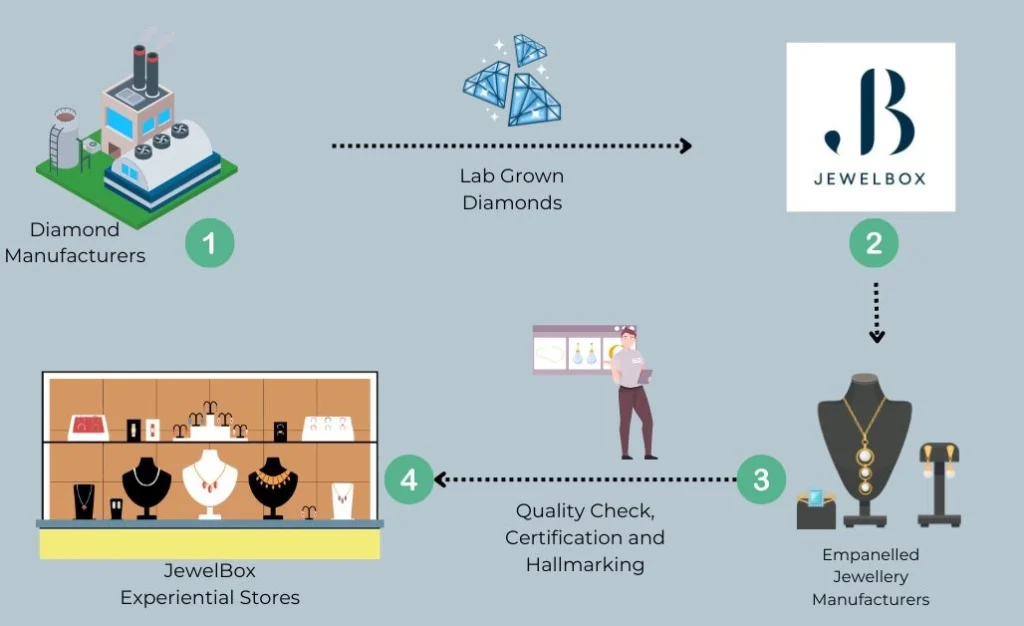
The company does not manufacture lab grown diamonds, and has a stock and sell mode. Here are the steps, from the manufacturer to the end consumer, the company follows:
- Lab grown diamonds are first procusrred from LGD manufacturers.
- Jewel Box has an in-house design team that designs the jewellery.
- Sorting team then issues diamonds and jewellery designs to empannelled vendors for the production of the jewellery sets.
- After the production, a Quality Check (QC) team then checks for quality issues, and any defects.
- Once the QC is completed, the jewellery is then sent for certification and hallmarking, after which it reaches the final customer.
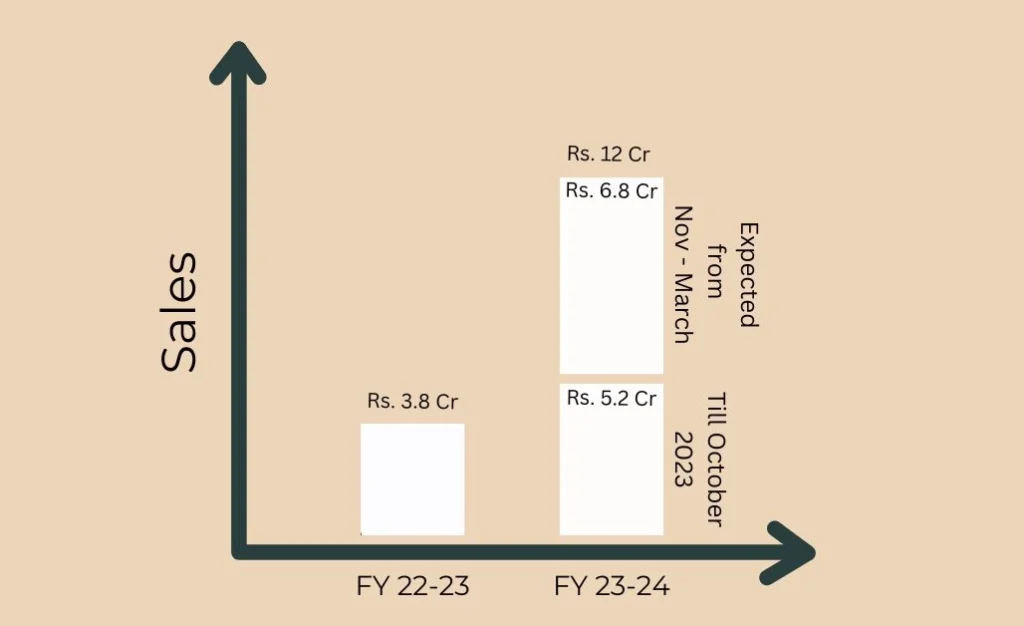
Jewel Box currently sells through two retail stores, which contribute significantly to its revenue growth. Its financial performance has shown impressive growth over the past two years.
The founders talked extensively about the financial performance of their company during the Shark Tank India Season 3’s pitch. The details are as follows:
Annual Sales of
- FY 2022-2023: Rs 3.8 crore
- FY 2023-2024: Rs 5.2 crore (till October 2023).
Owing to coming Diwali and wedding season in India, they expected to close the financial year at Rs. 12 Crore.
The company is profitable with a positive 15% EBITDA.
Earnings Before Interest, Taxes, Depreciation, and Amortization (EBITDA) is a measure of profitability. This number is used by investors to gauge the profit generated by a company from its operations. EBITDA is esecially important in asset-intensive industries like Jewel Box (large inventory value).
Jewel Box aims to expand its presence in the luxury jewelry market by increasing its production and retail footprint. They plan to open more retail stores to reach a broader customer base and enhance their online sales platform for better customer engagement.
Additionally, they intend to invest in research and development to innovate and improve their production processes. Jewel Box aims to educate people about these benefits to increase demand.
Overall, they are focused on expanding, innovating, and staying eco-friendly to become a top brand in the luxury jewelry market.
SWOT Analysis of Jewel Box as of 2024:
- Strengths
1. Innovative product, superior design and craftsmanship and transparency.
2. Increasing popularity and demand of lab grown diamonds.
3. First mover advantage: One the first few companies in the market.
4. Being aired on Shark Tank India and having secured an investment builds trust and credibility in the mind of the consumer. - Weakness
1. India has still not accepted LGD completely and there is still a taboo around buying a lab diamond.
2. As pointed out by Vineeta Singh during their pitch, their branding is similar to that of Blue Stone, which can hamper their brand building. - Opportunities
1. Growing demand for affordable luxury jewelry, which has the potential to expand the product range and market reach.
2. No other brand, other than Fiona Diamonds, have multiple retail outlets for LGD Jewellery.
3. LGD are 20-25% more expensive in the US and hence a great opportunity to tap into NRIs and foreign nationals who have a higher acceptability to LGD than Indians.
- Threats
1. Competition from both natural and other lab-grown diamond jewelers.
2. Their only USP is their design, which is very subjective. So, another player or a new entrant can easily replace them.
3. Peyush Goyal also suggested that the only differemtiation that will remain will be execution. He emphasied that the company with strong retail execution will become the leading LGD brand in India.
Read More at:
- Analysis of Shark Tank Canvaloop: Converting Agri-Waste into Fiber
- The Story of P-Tal: An Ayurvedic Kitchenware Brand from Shark Tank India Season 3

All the five sharks, Aman Gupta, Radhika Gupta, Vineeta Singh, Peyush Goyal and Ritesh Agarwal were interested in the company and were confident that the lab grown diamond industry is going to be huge in India soon.
Although the company was bootstrapped till now, they have signed a term sheet with an invester whose due diligence was complete when the pitch was shot. According the the term sheet, they had raised 4.5 Crores of investment for a 45 Crore pre-money valuation (9.09%) and wanted the sharks to join at the current valuation.
Jewel Box received individual and group offers from all the sharks at the valuation of 44.44 Crores, but the founders wanted all the five sharks join their cap table and revised their offer to raise Rs. 2 Crore for 4% equity in the company.
The Shark Tank India pitch was in the final negotiations when Aman Gupta gave a final offer on behalf of all five sharks. He offered Rs. 2 Crores in exchange for 6% equity of the comapany.
Nipun Kochar and Vidita Kochar finally accepted the final offer presented by Aman and secured a 5-shark deal on Shark Tank India Season 3.
Conclusion on Jewel Box
Jewel Box is leading the way in making jewelry with lab-grown diamonds and being honest about it. They’re doing well financially and have beautiful jewelry designs (Vineeta Singh also loved their design and work).
Although some people might not trust lab-grown diamonds yet, the company still has a chance to grow by offering more types of jewelry and reaching more customers.
They might face competition and other challenges, but by focusing on making jewelry that people love and being smart about how they grow, Jewel Box is set to become a top name in the lab grown diamond jewelry world.

